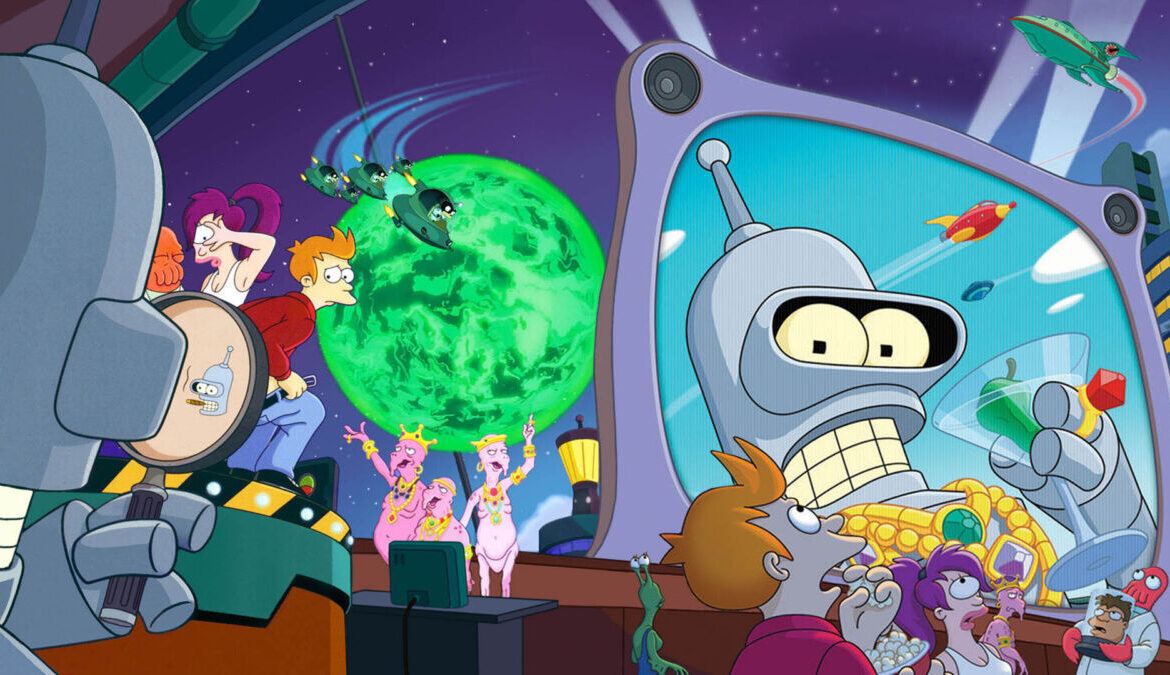Futurama was often considered the ‘other’ show when compared to its great companion, the lesser half to the might of The Simpsons’ colossal success, continuously cancelled, revived and rebooted in a seemingly never-ending cycle of death and rebirth. Matt Groening’s sophomore effort was never as beloved as its big yellow brother, a shame considering that there were multiple occasions on which Futurama matched, and often outshone, its Springfieldianite sibling.
Super smart, very funny and often deeply moving, Futurama is unquestionably one of the greatest animated shows ever created. Now that streaming giant Hulu is set to revive the adventures of the Planet Express Crew once again, there’s never been a better time to discover the finest cuts of a sci-fi saga that seems to get better on every revisit. After days of backbreaking labour and painstaking research, here are the 50 best Futurama episodes of all time.
NOTE: What constitutes a ‘season’ of Futurama remains a bone of contention thanks to the presence of feature-length specials and some runs having their releases split into separate halves. For this list, we’re using the Disney Plus and IMDb categorisation for season and episode numbers.
The Best Futurama Episodes
50. Less Than Hero | Season 5, Episode 6

“Clobbarella beats you up. Clobbarella beats you up. Who does she beat up? You! Clobbarella!”
It’s inevitable that at some point or another, most cartoons will eventually ditch convention and, for one night only, dedicate an entire episode to exploring what would happen if its protagonists gained superpowers. Family Guy has done it, The Simpsons did it, even the Smurfs took its miniature blue excrescences down Marvel street. It may be a familiar TV trope, but there’s nothing wrong with a little familiarity if done the right way, and Futurama certainly knew how to lean into a trend to get the best out of it.
Imbued with superhuman abilities after using a tube of miracle painkilling cream, Fry and Leela, with the help of ‘Super King’ Bender, form the New Justice Team and face off against the nefarious Zookeeper and his plot to steal the city’s famous Quantum Gemerald. Superhero episodes may elicit stifled groans from some sections of the viewing audience, but Less Than Hero has enough self-referential wit to make the most of its all too familiar premise.
49. A Pharaoh to Remember | Season 4, Episode 7

“Pharaoh Hamenthotep is dead!”
“*Sniff* He’s whipping angels now!”
If you can’t go back in time, the next best thing is to create a planet reminiscent of an evocative historical era and have your characters just go there instead. When Professor Farnsworth gives Bender, Leela and Fry the task of delivering a huge sandstone block to the planet Osiris IV, the trio are quickly enslaved by the Egyptian-like inhabitants and forced to construct mighty pyramids at the behest of the Pharaoh.
A Pharaoh to Remember is less concerned with the miseries of slavery than it is with Bender’s desire to be remembered, John DiMaggio’s egomaniacal robot idolising the inhabitants of Osiris IV for their idolatry of their god-Pharaohs and attempting to be immortalised in the same way via the construction of a huge statue in his honour. Bender’s realisation that his terrible deeds will be more important to his legacy than any statue of the monument is an odd ending if dwelt upon for too long, but it satisfies the episode’s need to resolve its narrative arc.
If you don’t think about it too hard, A Pharaoh to Remember just about gets away with it.
48. Stench and Stenchibility | Season 10, Episode 12
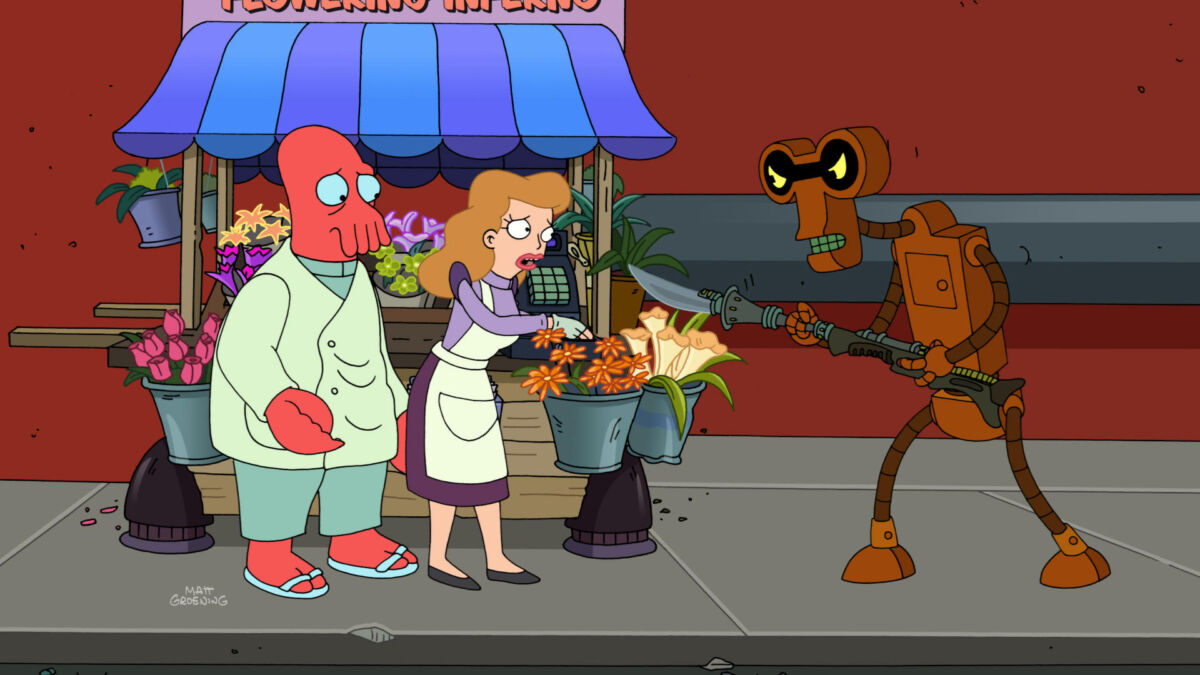
“There, my home’s all clean except for one part: the inside.”
The penultimate episode of Futurama (thus far) sees the focus shift to Zoidberg as the incompetent doctor finds love in the form of a flower vendor (Emilia Clarke) with no sense of smell. Obviously.
It’s a peculiar episode, not least because it centres around one of its supporting cast members’ bid to find true love, as well as offering up a bizarre subplot in which Bender is attempting to win a tap-dancing contest against a six-year-old girl. The show may be called Futurama, but it’s a storyline that could’ve been lifted from practically any show or sitcom regardless of where and when it happened to be set.
Despite its faults, Stench and Stenchibility’s strength is that it’s sweet and sincere, giving Zoidberg the happy ending he deserves following years of hilarious misery and suffering. After all, if anyone deserves to find happiness after a 14-year run, why not Zoidberg?
47. Law and Oracle | Season 8, Episode 4
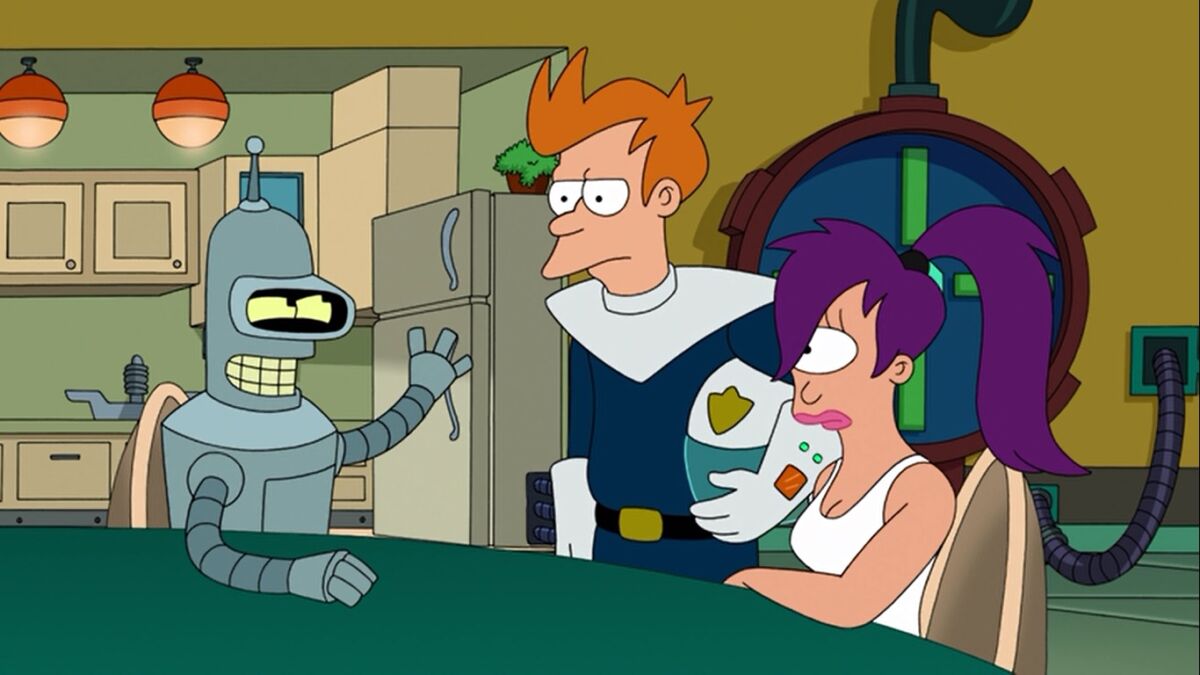
“Ever heard of the future crimes division?”
“Tomorrow I have.”
Police Academy crosses with Minority Report in Law and Oracle, a fun, flippant episode that relies heavily on cultural references but remembers to bring enough of the show’s signature humour to stand on its own two feet. Disillusioned with his life as a delivery boy, Fry quickly retrains as a policeman, his pairing with smooth blaxploitation robocop URL finally giving a chance for one of Futurama’s most underrated characters to shine.
Fry is quickly drafted into the police’s future crimes division, relying on the department’s ‘Oracle’ to bust perps before they’ve even committed crimes. Soon the inevitable occurs, of course, and Fry is predictably sent to arrest Bender for his hypothetical theft of some precious malt liquor.
It’s a decent enough setup, but Law and Oracle’s strongest point is unquestionably its introduction of the unforgettable police Chief O’Mannahan, a bullish, relentlessly macho spin on the usual police chief archetype who smokes, drinks and pushes out heavyweight newborns during her lunch break. The ultimate fantasy woman.
46. Bender’s Game | Season 6, Episode 3
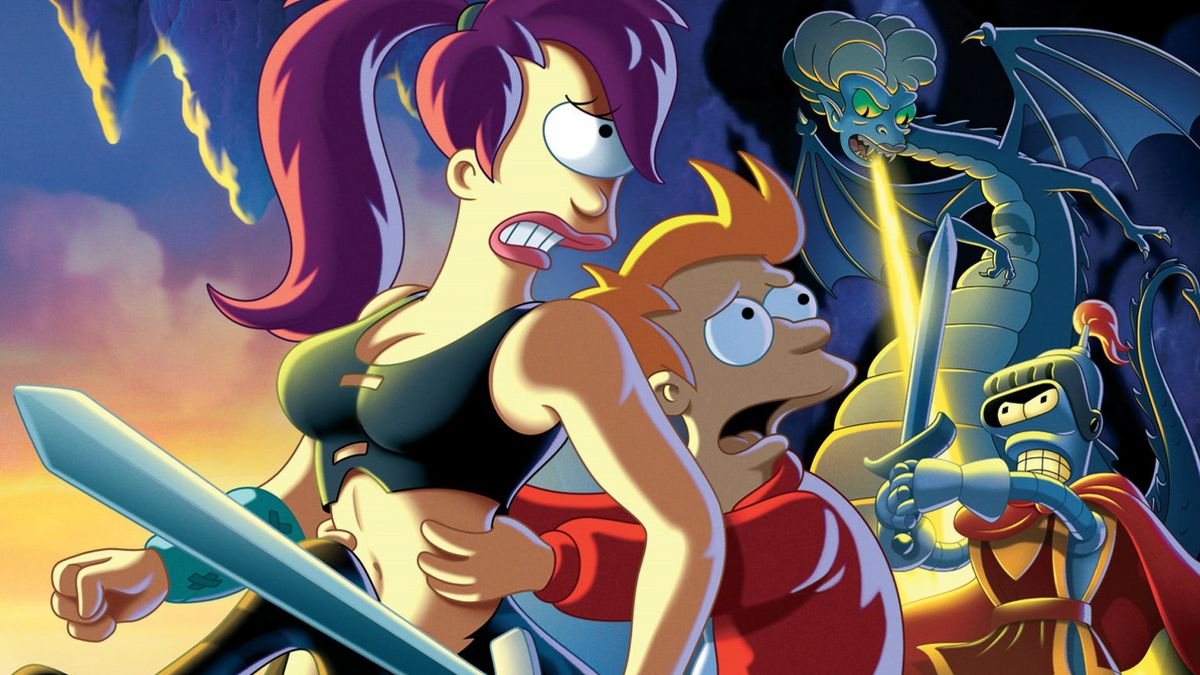
“When will young people learn that Dungeons and Dragons won’t make you cool?!”
In its clunkiest entry ever, Wikipedia rather pleasingly describes Bender’s Game as an “American direct-to-video adult animated science fantasy comedy film.” That just about sums it up.
A Dungeons and Dragons pastiche set partially in an alternate fantasy universe, Bender’s Game sees the Planet Express crew setting off to infiltrate a dark-matter mine as fuel prices rocket, only to discover a fantasy realm with some rather familiar-looking faces.
There are times when Bender’s Game is slightly all over the place, and it’s certainly an easy target to parody Dungeons and Dragons, beloved and reverential as the exercise may be, but it’s a welcome departure to see the Futurama gang inhabiting a world whose tropes and tricks are so familiar to us all. The requirement for Leela to wear an anger management shock collar and Bender’s fantastical delusions that he really is Titanius Anglesmith, ‘fancy man of Cornwood’, are the comedic high points of the feature-length fantastical spoof.
Either way, it’s better than Disenchantment.
45. Fry and Leela’s Big Fling | Season 10, Episode 2
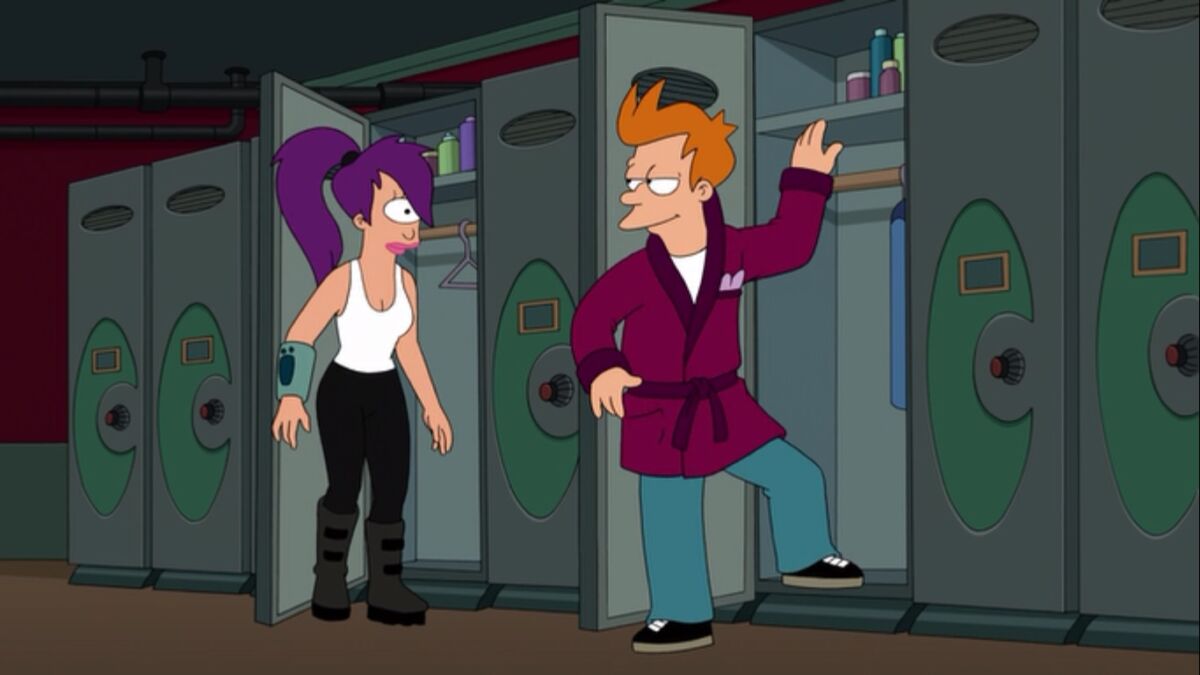
“Leela, somebody might see wingus and the ping-pong boys.”
Fry and Leela were constantly fluctuating between on and off during their tumultuous relationship, but later seasons would finally see the show confirming that the pair were something resembling a proper couple, albeit one about whom the rest of the Planet Express crew were entirely ignorant.
Getting time to themselves, however, proves easier said than done, and the duo are forced into taking a vacation at a private island that ends up hiding a more sinister secret. Meanwhile, Bender, Amy and Zoidberg make for an unusual triumvirate as they travel to the Planet of the Apes to deliver a package and reunite with Guenter, the hyper-intelligent monkey last seen in the episode ‘Mars University’ from Season 2.
Fry and Leela moments, let alone full episodes, are in many ways Futurama’s ace up the sleeve, always acting as the emotional core around which the entire experience ultimately revolves. Because the writers had spent so much time until this point drip-feeding the audience with small moments of intimacy and affection between the two, the idea of the pair’s relationship becoming stifled gains some texture and weight, rendering Fry and Leela’s Big Fling a satisfying instalment that never quite ends up breaking many boundaries. An enjoyable fling, nonetheless.
44. I, Roommate | Season 1, Episode 3
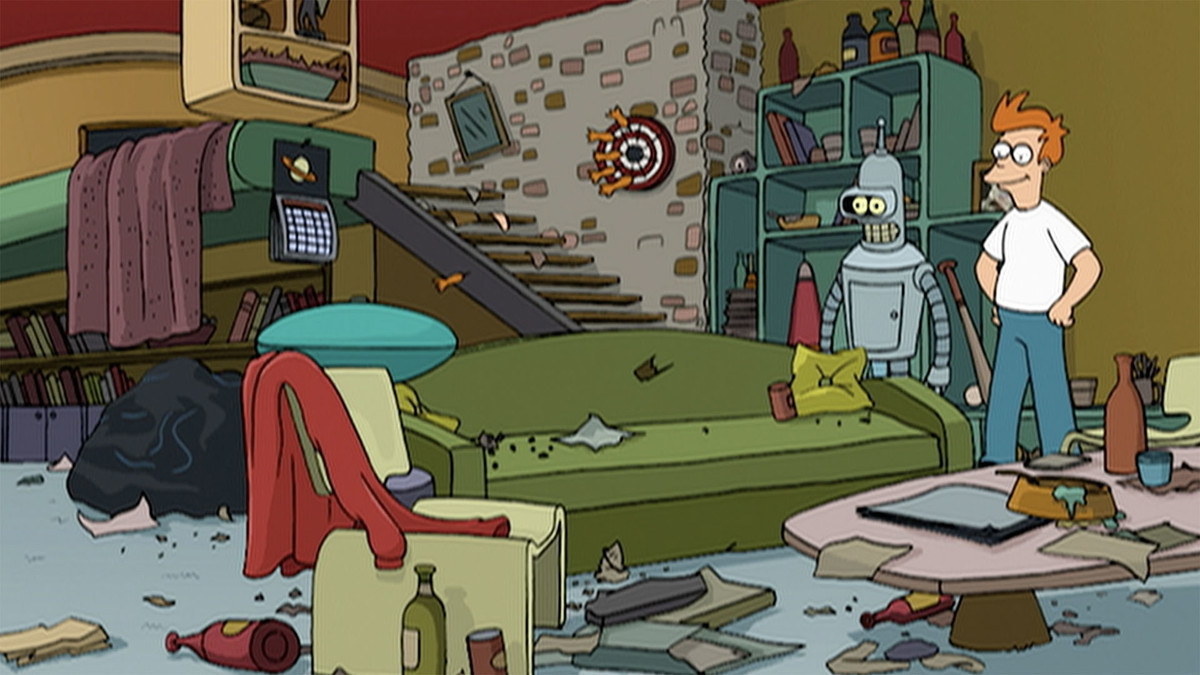
“You know Fry, of all the friends I’ve had, you’re the first!”
Season 1 of Futurama was still in the process of nailing down many of its character dynamics and narrative setups, to the extent that Fry is still living at the Planet Express office by the time of the third official episode, a situation that the rest of the company’s staff find utterly untenable.
This sparks off I, Roommate’s central narrative quest as Fry seeks permanent accommodation, initially moving in with Bender before realising that robot apartments consist of little more than a stationary cupboard-sized hole not fit for human habitation. Fry and Bender, still keen to be roommates, manage to track down the perfect downtown apartment, but things go awry and their friendship becomes strained as Bender suffers an emotional breakdown as a result of Fry seeking his own dwelling.
Being a Season 1 episode, I, Roommate evokes a show still feeling its way, and there’s just a hint of things being a little bit contrived, especially when it’s revealed that Bender’s aerial is interfering with the new flat’s satellite TV (a pretty solvable problem). What I, Roommate does effectively is to establish one of Futurama’s key duos and their unique dynamic, a dynamic that would become central to the show’s success for the next 15 or so years. It also birthed one of the best Futurama quotes of all time.
43. The Cyber House Rules | Season 3, Episode 11
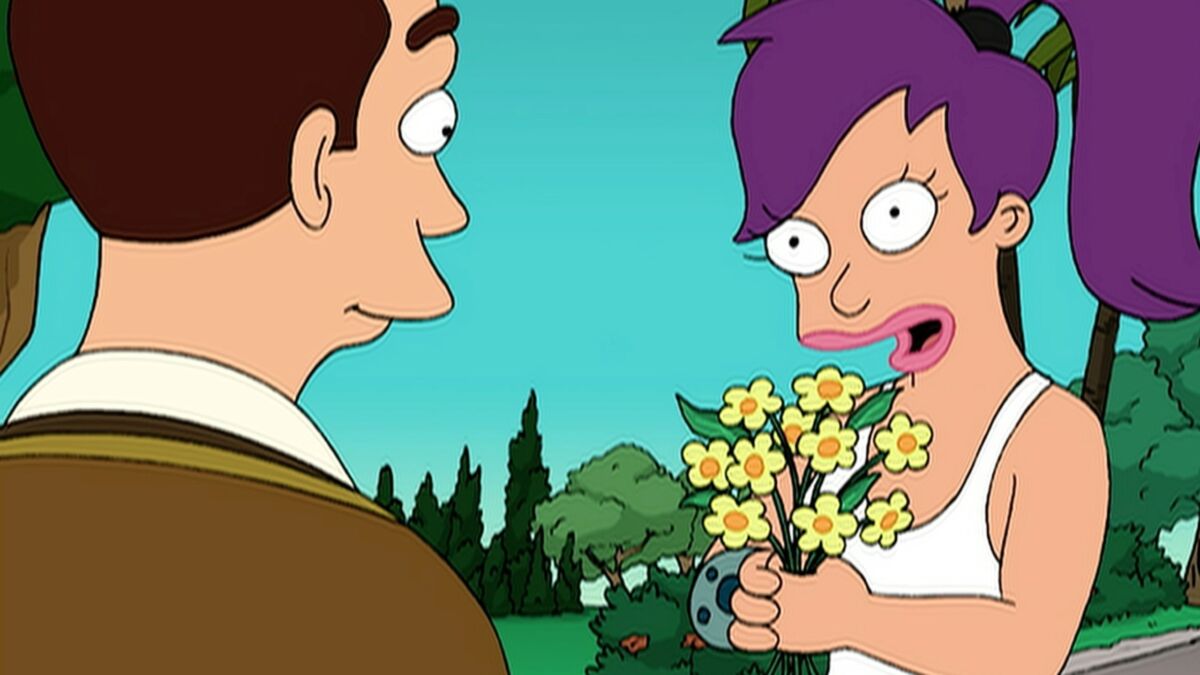
“Listen buddy, by the end of the day, one of us is gonna’ have one eye!”
Futurama’s third season is packed with highlights, but The Cyber House Rules is one of the more sincere, grounded outings from a run that was starting to use the show’s far-out futuristic concept to maximum effect.
The Cyber House Rules focuses on Leela who, after running into one of her former cohabitees from the orphanarium where she was raised, grows tired of being seen as a freakish outsider and opts to have surgery to split her single eye into two, thus rendering her ‘normal’. In doing so, Leela falls in love with the surgeon who performed her op, the outrageously straight-laced Adlai Atkins, much to the protestations of Fry, the only person who feels that the procedure was a huge mistake.
Sincere without being sentimental, The Cyber House Rules reaches its inevitable conclusion with its heart in the right place. Counteracting any excess in sentimentality, however, is Bender’s gloriously exploitative subplot in which the robot adopts scores of harmless orphans in order to receive the $100-a-week-per-child government stipend, only to be later arrested for child cruelty.
42. A Bicyclops Built For Two | Season 2, Episode 13
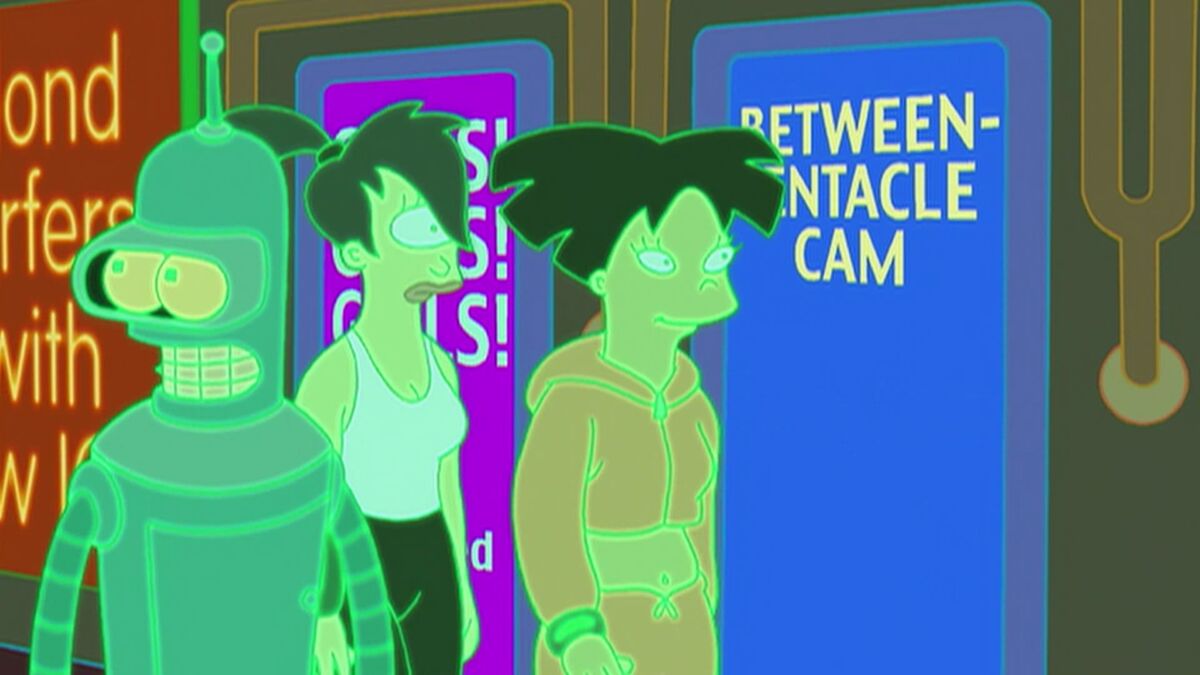
“Well, thanks to the Internet, I’m bored with sex. Is there a place on the web that panders to my lust for violence?”
“Is the Space Pope reptilian?”
Poor old Leela could never really catch a break. Abandoned to an orphanarium and raised as a one-eyed mutant cyclops, it’s no wonder that most episodes centring on Planet Express’s most capable member focused on Leela’s quest to find out who she truly was. Airing as part of Season 2, A Bicyclops Built For Two was one of the first to see Katey Sagal’s one-eyed wonder trying to figure out exactly who she was as Leela visits a fellow cyclops named Alcazar after the two meet on Futurama’s version of the internet.
There’s something slightly off about Alcazar’s world, however, and it soon becomes apparent that things aren’t all they seem with the man claiming to be the only other cyclops left in existence. There’s a sense of predictable inevitability as Bender and Fry uncover Alcazar’s shameful secret, but not to the extent that it undermines the quality of the episode as a whole.
Best of all is the episode’s nod to Married with Children, the sitcom that helped launch Katey Sagal’s career, as Leela teeters around on ludicrously high heels sporting Peggy’s ridiculous bouffant hairstyle.
If only they’d managed to secure Ed O’Neill to voice Alcazar, things would have been truly great.
41. A Fishful of Dollars | Season 1, Episode 6
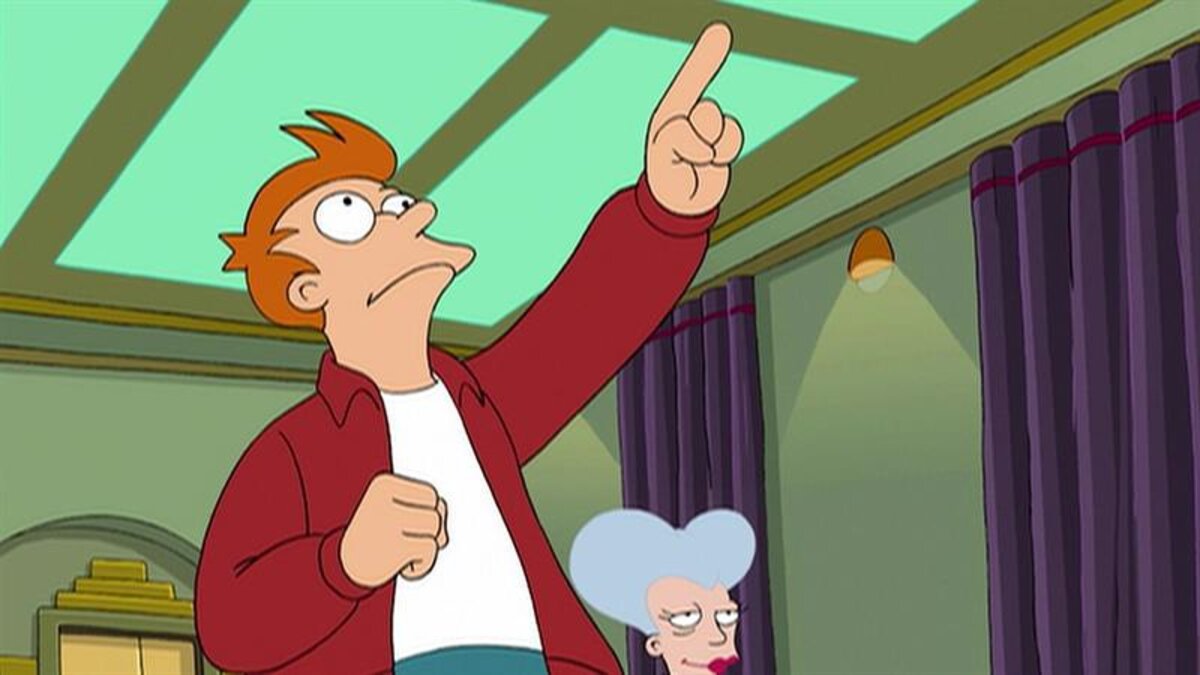
“Do you remember a time when women couldn’t vote and certain people weren’t allowed on golf courses? Pepperidge Farm remembers.”
Great episode though it may be, there are points during A Fishful of Dollars (one of the best Futurama titles) when it’s hard not to feel frustrated at Fry’s dunder-headedness. The internal logic of sitcoms requires everything to return pretty much to the status quo, but there’s still something inherently frustrating about watching Fry squander billions through his own idiocy and stubbornness.
After discovering that a thousand years of cumulative interest has made him into a billionaire, Fry becomes isolated and reclusive as he surrounds himself with the material possessions of the 20th century, most notably a tin of anchovies that, unbeknownst to him, has the capacity to bankrupt Mom’s Friendly Robot Company for convoluted reasons.
A Fishful of Dollars is the sort of episode that spends most of its time with its tongue planted in its cheek, from the ridiculous (but mathematically correct) calculation of Fry’s wealth to the idea that anchovies are valuable because their DNA can be spliced into children to make cheap robot oil, but it’s these convoluted and strange premises that made Futurama so iconic.
40. The Bots and the Bees | Season 9, Episode 1
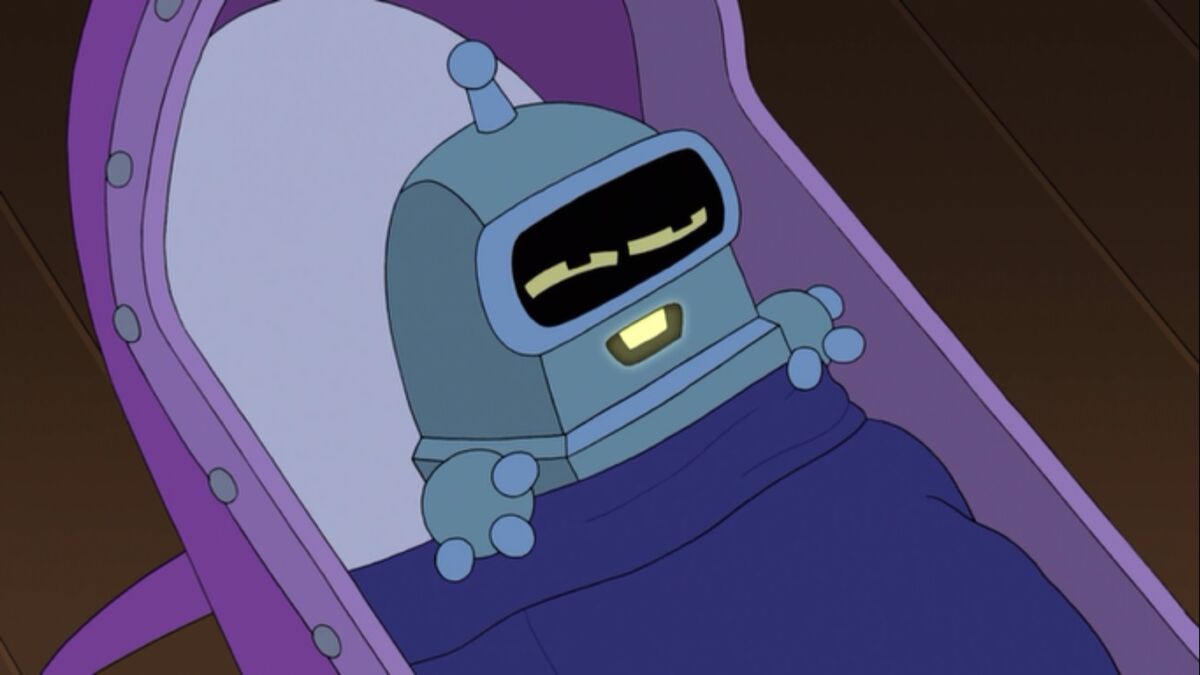
“Oh, no, no, no, no way am I that kid’s dad”
“Wipe my tiny metal ass.”
“Oh crap.”
Fatherhood gets introduced to most shows with startling regularity, the introduction of an unwanted child is akin to throwing a foetal hand grenade that shatters the traditional dynamics and shakes up its established norms.
It’s a trick that usually wears pretty thin pretty fast. What Futurama always had at its disposal, however, was the capacity to shake up these tired tropes via use of its outlandish futuristic premise, and while many a human baby has been birthed on-screen to give a show the proverbial kick in the pants, few introduce a tiny infant by having a robot make love to a drinks machine and have the resultant offspring drop out into a soda cup.
What makes The Bots and the Bees work is Bender’s aptitude and sincerity as a father. Only showing certain character features, be they good or bad, can become tiresome, but Bender’s devotion as a dad makes him well rounded, sympathetic and, ultimately, much more human. For a while at least.
39. A Big Piece of Garbage | Season 1, Episode 8
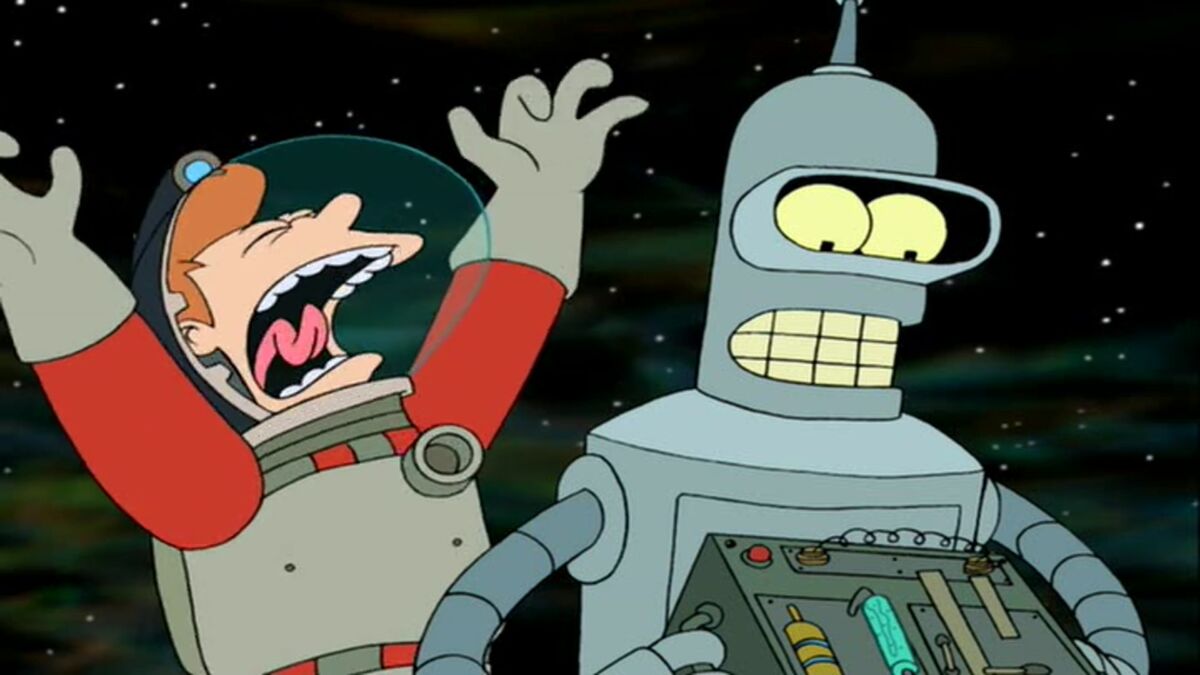
“Wernstrom!”
After being humiliated by his rival and former pupil at the latest Academy of Inventors annual awards ceremony, Professor Farnsworth uses his high-powered smell-oscope to locate a giant ball of garbage that appears to be on a collision course with Earth, thus triggering a race against time to stop the mound of stinking trash from destroying the planet and costing billions of lives.
While the actual premise of A Big Piece of Garbage may seem ridiculous, it isn’t much less absurd than many of the real-world allusions that the episode makes to our own contemporary environmental crisis. The large trash barge which is eventually shot into space is a direct reference to the actual Mobro 4000 barge of the 1980s, while the waste and profligacy of Fry’s contemporary New Yorkers is a direct reference to the city’s ongoing litter crisis.
The point of A Big Piece of Garbage is to draw attention to how ridiculous the entire environmental crisis actually is. By juxtaposing real-world examples of waste management with an outlandish sci-fi premise, A Big Piece of Garbage makes the real-world situations from which it draws seem all the more absurd.
38. How Hermes Requisitioned His Groove Back | Season 2, Episode 14
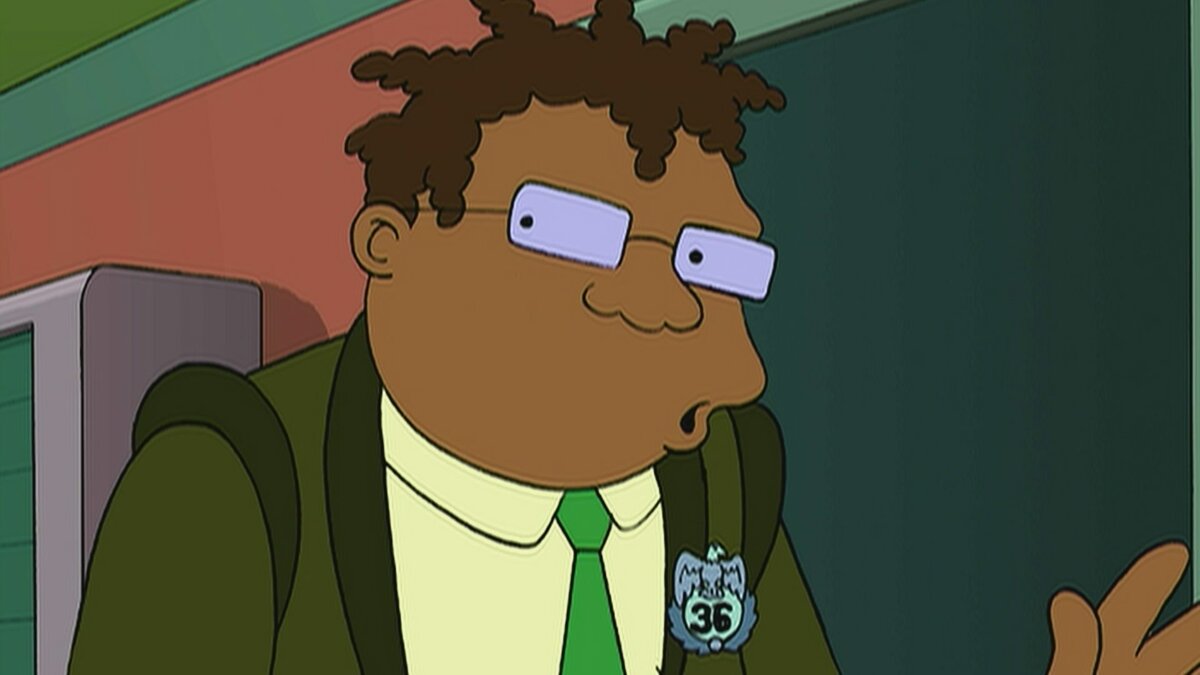
“I’m surrounded by neat freaks every day. There’s nothing kinkier to me than a filthy slop-jock like you.”
“Oh, stop!”
Yes, a Hermes-centric Futurama episode. A good Hermes-centric Futurama episode, no less.
Hermes Conrad has always been an oddity among the crew of Planet Express. The Rastafarian accountant isn’t especially strange or notable, especially when compared to many of his contemporaries, but therein lies the issue: there isn’t really a huge amount to Hermes at all. Aside from the occasional rhyming exclamation or joke about bureaucratic efficiency, there are other, better characters on which to hang a full-length, strand A narrative.
How Hermes Requisitioned His Groove Back is in many ways the exception that proves the rule, a one-off that sees Hermes denied promotion by the Central Bureaucracy after an inspection at his office goes wrong. Perhaps the best aspect of the episode is the introduction of Morgan Proctor, a straight-laced bureaucratic inspector whose fetish for mess and slovenliness causes her to develop an obsession with Fry and his sub-standard personal hygiene.
The episode’s closing musical number is also a notable highlight.
37. Why Must I Be A Crustacean in Love? | Season 2, Episode 9
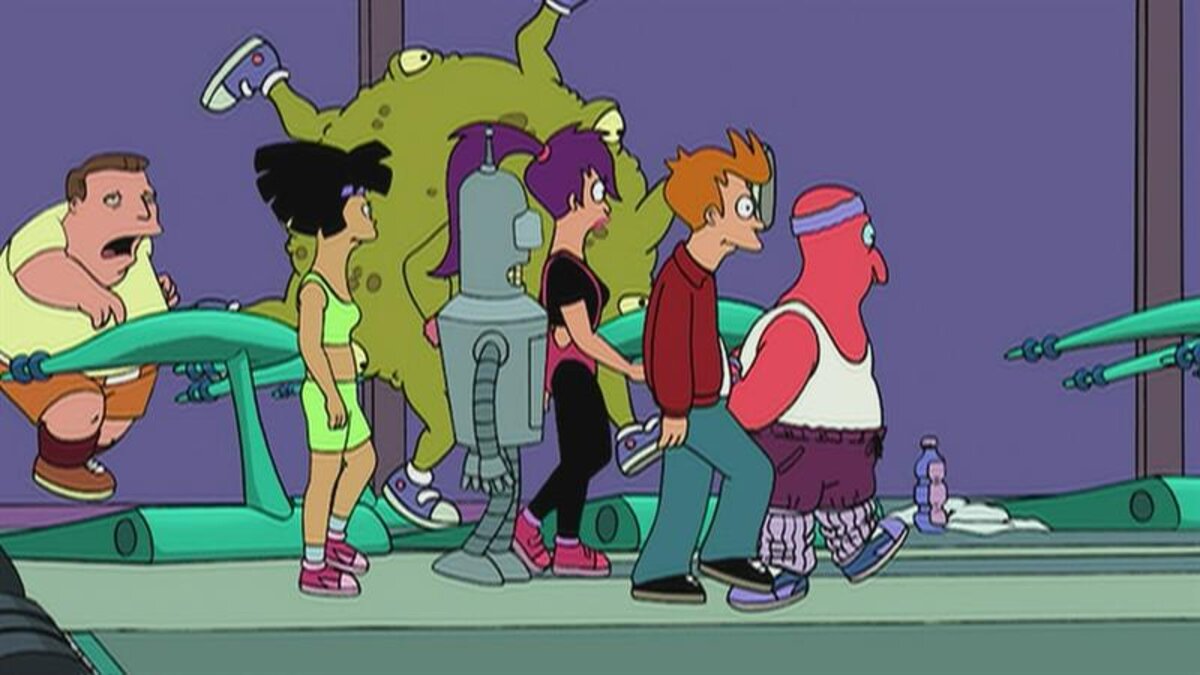
“So you have to choose between life without sex and a hideous, gruesome death?
“Yes.”
“Man, tough call.”
Futurama tended to use its supporting cast of heroes relatively sparingly, relying on its core triumvirate to drive most of its central narratives or else conjuring stories from Professor Farnsworth’s latest logic-defying inventions. The rest of the Planet Express crew are always present and valuable, but they rarely drive their own narratives or see their backstories explored in the way that Fry, Leela and Bender do.
Why Must I Be A Crustacean in Love? Is a rare chance to see the spotlight shone on one of the team’s most popular supporting members. Hated by most of his teammates but a gift for audiences delighting in his failing, a Dr. Zoidberg-centric episode was only going to make sense if it focused on the lousy lobster’s fatal inadequacies.
In it, Zoidberg exhibits erratic behaviour as a result of his species’ impending mating season, a season in which Zoidberg struggles to find a suitable sexual partner. In recruiting Fry to become his expert on the opposite sex, Why Must I Be…? is a neat blending of the tale of Cyrano de Bergerac with the final scene from Star Trek’s Amok Time. It’s lightweight and silly, but packed with enough character-driven humour and pathos to make it really work. One of the funniest episodes around.
36. Overclockwise | Season 8, Episode 12
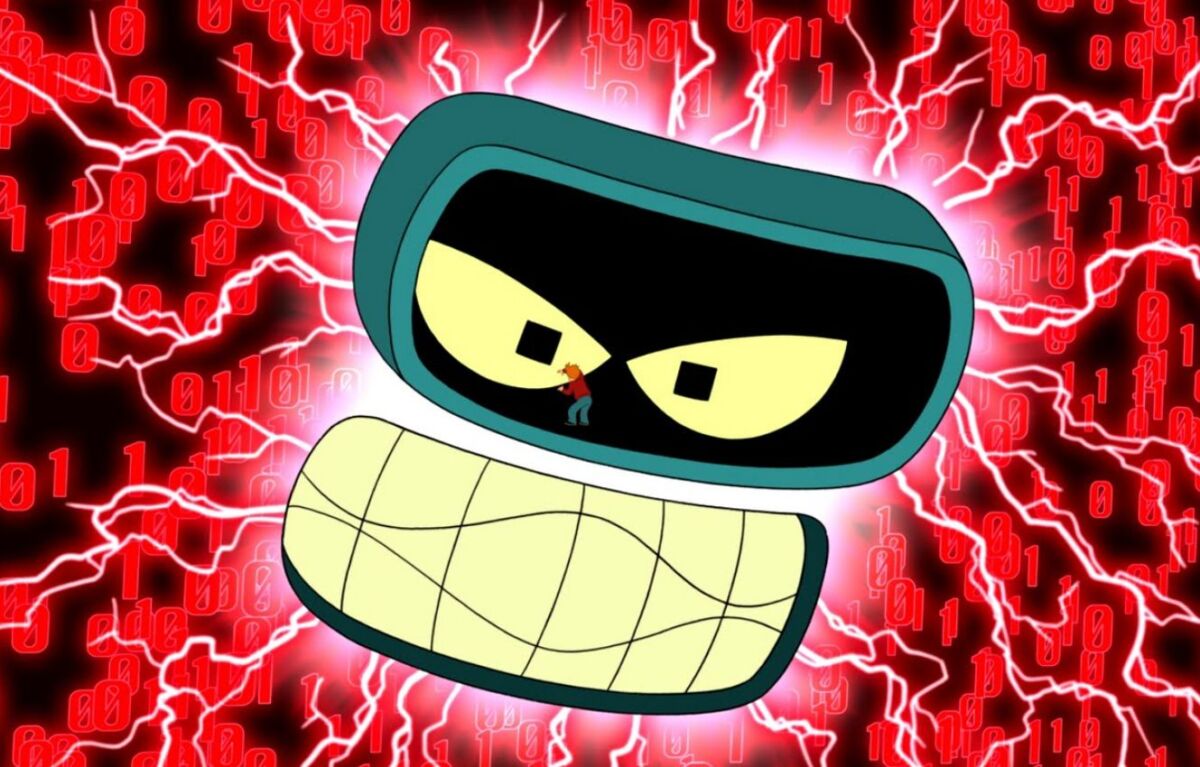
“Did you see me? History came alive and I killed it!”
Futurama’s eighth season represents pretty much the sci-fi cartoon’s nadir. Still eminently watchable but never coming close to matching the standard set by earlier seasons, Season 8 is characterised by mediocrity and wasted potential that never lives long in the memory, the high-stakes ideas that, at its peak, made it one of the most watchable things on TV becoming increasingly thin on the ground.
Overclockwise, however, in which Bender becomes an all-powerful CPU capable of answering the universe’s great questions and creating heavy elements at will, is a highlight of an otherwise disappointing run that’s funny and smart while being grounded by an emotional centre. It’s still not quite up there with the best that Futurama could be, but it’s certainly an episode that showed the magic hadn’t dissipated with the years.
Furthermore, the episode’s ending, considered one of the show’s four ‘alternate’ finales, is touching, sweet and subtly done.
35. When Aliens Attack | Season 2, Episode 3
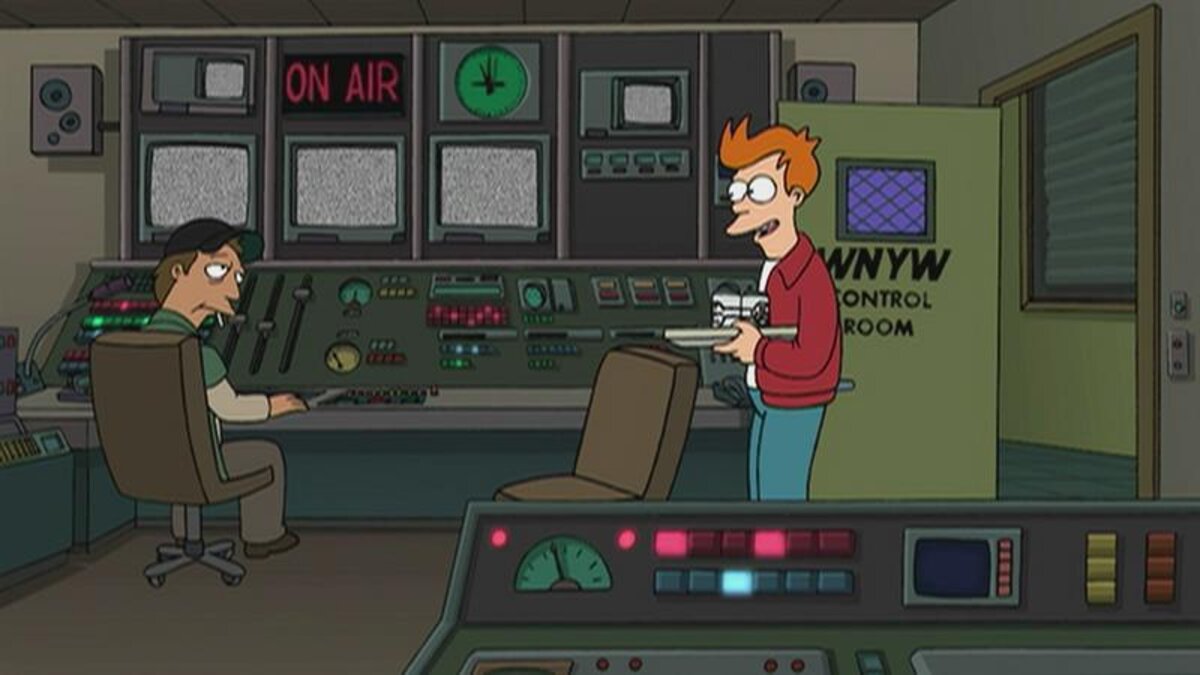
“If we hit that bullseye, the rest of the dominoes will fall like a house of cards. Checkmate.”
It’s a testament to Futurama’s writers that in an episode seemingly revolving around the invasion of Earth by an all-powerful alien race, the main focal point of parody ends up being contemporary Fox shows and the medium of TV itself.
When Aliens Attack sees Lrrr and the inhabitants of Omicron Persei 8 descend on Earth after becoming outraged that their favourite Earth show ‘Single Female Lawyer’ is knocked out by Fry’s actions in the past. In order to save Humanity, Fry and the rest of the Planet Express crew must remake the Single Female Lawyer to satisfy Lrrr’s need for middling legal melodrama.
When Aliens Attack is far more concerned with television as a medium and the conventions surrounding it than it is with an actual alien invasion. From its parodying of Ally Macbeal to Fry’s own metacommentary on how show’s are constructed, When Aliens Attack is the writers looking inward at the peculiar, and often ridiculous, medium in which they work. It also boasts the greatest TV theme tune of all time.
34. The Series Has Landed | Season 1, Episode 2
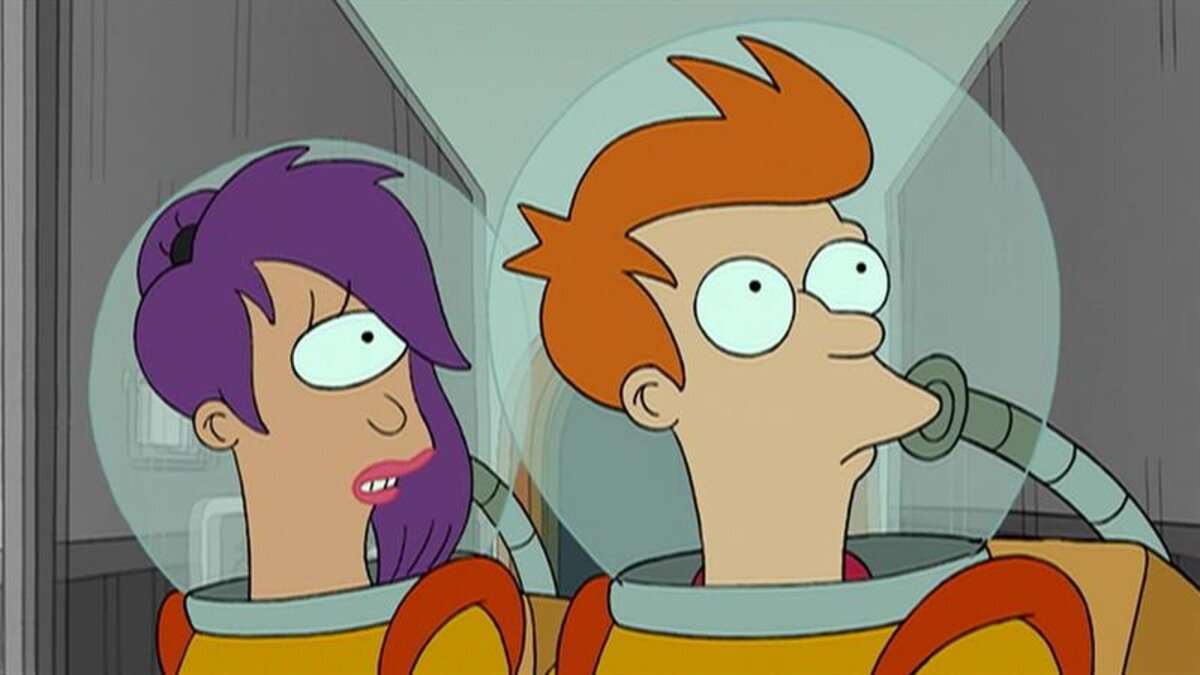
“Planet Express. Our crew is replaceable. Your package isn’t.”
Space Pilot 3000 assembled Futurama’s bare skeleton with remarkable confidence, but it would take an entire season for the show’s characters to fully coalesce. The second episode of the first season does a fine job of putting some flesh on those bones, though, bringing in Amy Wong, Dr. Zoidberg, Hermes Conrad and a few recurring minor characters into the fold. With Leela, Bender and Fry now operating as Planet Express’ new main crew, the trio, plus Amy, must make a delivery to the moon, which is now blighted by a sub-Disney amusement park.
Character introductions aside, The Series Has Landed is effective at nailing so many things right off the bat, operating its own cohesive narrative while establishing so much of what would go on to anchor Futurama as a creation with as much raw emotional resonance as subversive references to science fiction.
The idea of human progress diminishing, or indeed reshaping, the parameters of what we deem exotic or impressive, for instance, runs through the heart of the show’s second effort. Fry’s wonder at being on the moon initially seems naive and childish to Leela who, thanks to massive space colonisation, has grown accustomed to travelling across the vast swathes of the universe, but she learns to establish the things she had taken for granted as the story reaches its climax.
33. Three Hundred Big Boys | Season 5, Episode 11
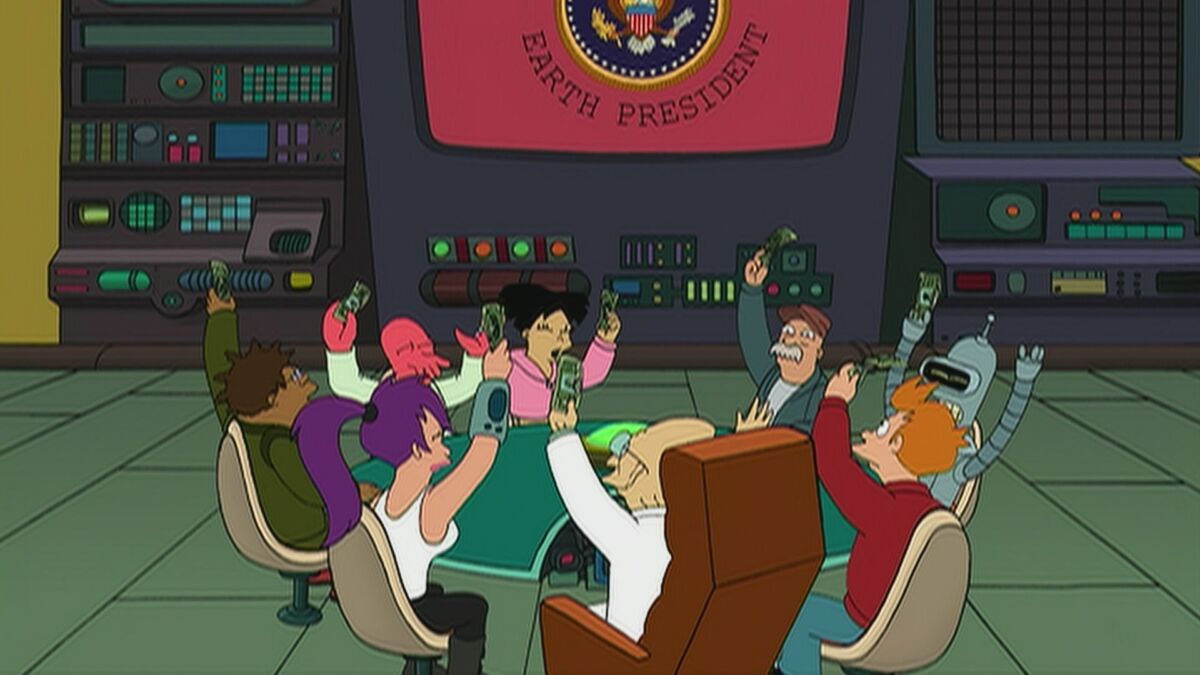
“I’m a whale biologist!”
Three Hundred Big Boys isn’t the most far-out space adventure in the Futurama canon, but it’s certainly one of the most meticulously grafted.
After Zapp Brannigan’s noble conquest of a race of peaceful and artistic arachnids from another planet, President Nixon issues every citizen of Earth $300 to do with as they so please, sparking off each distinct narrative thread as the members of the Planet Express debate how to use their newfound wealth.
Three Hundred Big Boys is rendered exceptional by its construction, each storyline pulling the narrative apart before it all comes together (more or less) and order is once again restored. There’s too much squashed into Three Hundred Big Boys’ packed narrative to be summarised in a few mere paragraphs, suffice to say that talented scribe Eric Kaplan ties things together in a way that is both ridiculous and cohesive all the same, the episode’s end sequence one of the finest denouements in the show’s run.
32. A Flight to Remember | Season 2, Episode 1
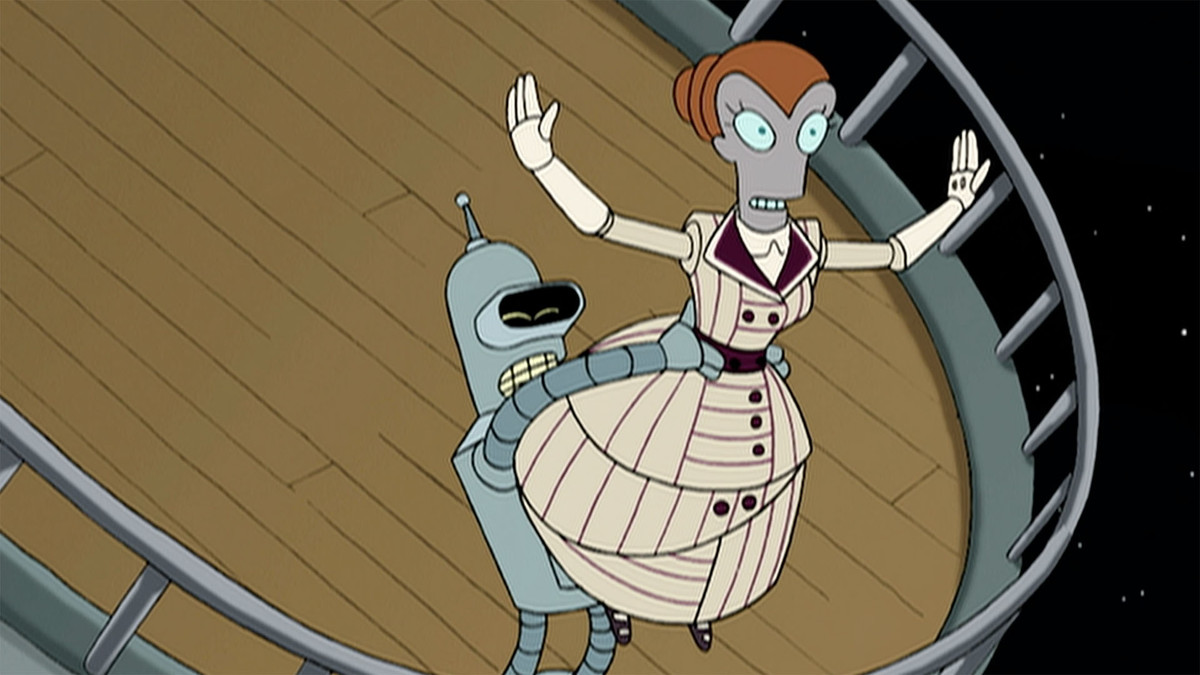
“Comets, the icebergs of the sky.”
For a show set 1000 years in the future, Futurama wasn’t half keen on parodying the moments and pop cultural events of the 20th and 21st centuries. That, of course, is part of the joke, the writers taking an established and familiar event or piece of familiar media and transposing them into the show’s retro-futuristic setting for comic effect.
A Flight to Remember sees the trick pulled off with the Titanic, a double-whammy in that it happens to be both an iconic mainstream movie and a real-life disaster with which contemporary fans are all familiar. Trade the water for the stars, switch a few of the passengers out for robot replacements and slap Zapp Brannigan at the ship’s helm and bingo: you’ve got yourself Futurama’s take on everyone’s favourite story of star-crossed lovers freezing off the Atlantic coast. But in space.
31. Anthology of Interest II | Season 4, Episode 3

“As a robot, I can’t feel human emotions, and sometimes that makes me sad.”
Anthology of Interest episodes were essentially Futurama’s answer to The Simpsons’ Treehouse of Horror. Featuring a series of hypothetical scenarios played out thanks to Professor Farnsworth’s ‘What if’ machine, the Anthology of Interest episodes never quite caught on the way that The Simpsons’ non-canonical horror showings did. It’s a shame, because both Anthologies are shining lights within their respective seasons.
The second Anthology doesn’t quite hit the heights reached by the first, but it’s still an enjoyable diversion to see a series of hypothetical scenarios that break away from Futurama’s canonical story.
I, Meatbag, possibly the episode’s highpoint, sees Bender enjoying his life to excess as a human being, while Raider of the Lost Arcade pays homage to the joy of arcade gaming when Lrrr invades in a manner similar to Space Invaders.
Perhaps least convincing is Wizzin’, in which The Wizard of Oz is parodied as a result of Leela being knocked unconscious by the What-if Machine’s lever. There’s nothing actively wrong with Wizzin’, but Oz-based parodies have been so routinely done to death that it’s hard to find much new material in a 7-minute short.
30. Hell is Other Robots | Season 1, Episode 9
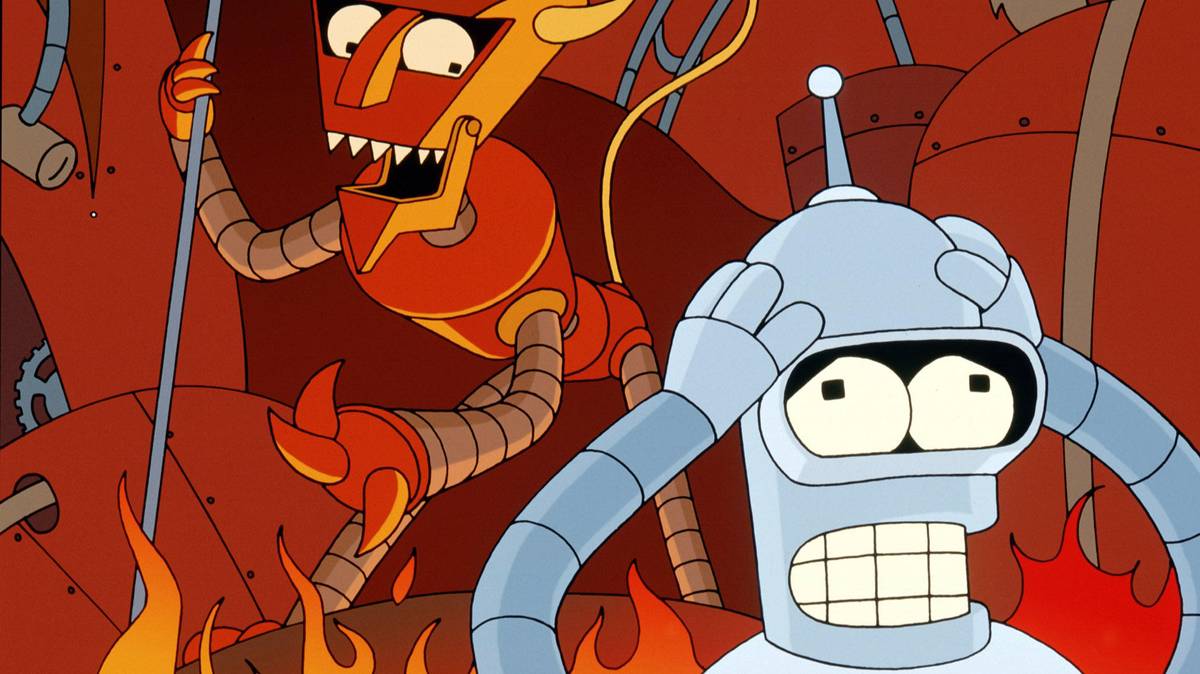
“Bender, are you alright?”
“No. Oh, they’re tormenting me with up-tempo singing and dancing.”
One of Futurama’s best jokes has always been the idea that robots are essentially humans in metal cases, filled with the same foibles, superstitions and basic character traits as their meatbag cousins. The idea that there is a robot church, robot breeding and a robot hell is part of what makes the world of tomorrow such a vibrant and hilarious place.
If there was ever a robot to end up in hell, of course, it was going to be Bender. Hell is Other Robots sees Bender getting hooked on the ‘drug’ electricity before converting to religion and living life as an ascetic, Ned Flanders-esque bore, only to be duped by Fry and Leela into sinning and having his soul claimed by Dan Castellaneta’s musically-inclined Robot Devil.
Hell is Other Robots is a rollercoaster of fun, an episode that isn’t particularly high concept (the idea of a robot hell aside) but it moves so quickly from Bender’s addiction to his redemption and then damnation that it feels like a Dantean epic crammed into a prime time cartoon slot. For an episode purely centred on silliness and entertainment, look no further than Hell is Other Robots.
29. Xmas Story | Season 2, Episode 8
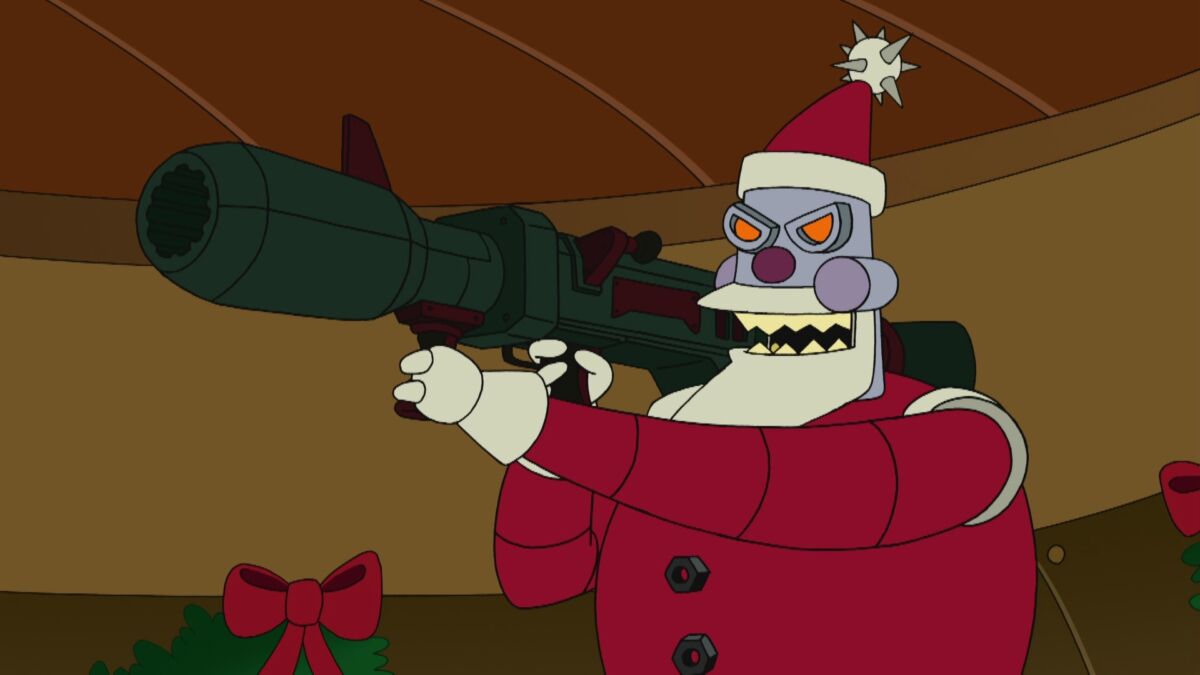
“There’s this girl who I really like, but she thinks I’m a jerk. Can you help me?”
“Yeah, there’s a suicide booth in the food court. Though there’s a line this time of year.”
There’s been a trend in recent years of taking the cuddly, cutesy family setup we normally associate with the festive season and subverting it into something darker, more cynical and more perceptive. Christmas episodes are usually a fun festive diversion from a show’s central premise, but they do risk becoming sentimental to the point of saccharine if handled incorrectly.
Xmas Story doesn’t suffer that problem, the Futurama writers pulling off their usual trick of taking an established cultural norm or event and twisting it to fit the show’s retro-futuristic setting. No longer a cuddly human with a luxuriant beard and hordes of diminutive workers, Year 3000 Santa is now a psychopathic robot (voiced by John Goodman) who annually terrorizes New York when the sun goes down.
Xmas Story takes the usual Christmas format and turns it on its head, but never to the detriment of the qualities that make the show work in the first place. It may be an episode revolving around a demonic robot Father Christmas, but Xmas Story uses its warmth and sincerity in just the right places, especially when it hints at the relationship between Fry and Leela possibly developing into something resembling a conceivable romance .
28. Love’s Labours Lost in Space | Season 1, Episode 4
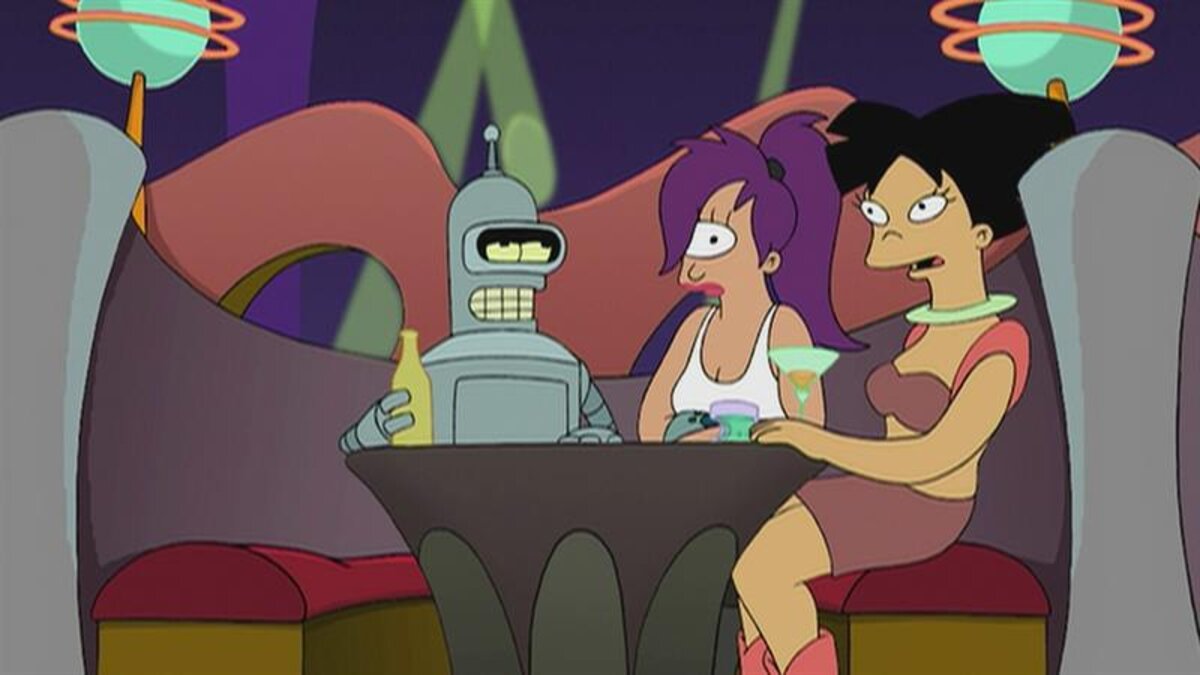
“Shall I fire on them now, sir?
“Not yet, Kiff. In the game of chess, you can never let your adversary see your pieces.”
Season 1 continued to drip feed characters from the Futurama roster at a steady pace. Love Labours Lost in Space sees the respective debuts of Nibbler, Leela’s ravenous alien pet, Lieutenant Kiff Croker and, of course, Zapp Brannigan, corset enthusiast, velour connoisseur and incompetent captain of the Nimbus spaceship.
When venturing out to save some animals from a dying planet, Leela ends up being reluctantly enticed by Brannigan’s unconventional seduction techniques, thus introducing the world to everyone’s favourite egomaniac (Bender aside).
Brannigan’s debut impressively manages to introduce pretty much every defining facet of the fat-headed military officer, from his relentless self-obsession, pathetic attempts at womanising, and incompetence as a military leader.
Equal parts brash, egocentric and utterly pitiable, the Captain Kirk parody would go on to be one of Futurama’s most beloved secondary characters, practically every one of his lines a lesson in bone-headed self-delusion. One of the show’s greatest gifts to humanity.
27. Obsoletely Fabulous | Season 5, Episode 14

“Save my friends! And Zoidberg!”
Themes of inadequacy and inevitable replacement run rich through Western media. From King Lear to The Sopranos, it’s a theme to which writers and artists consistently return, humanity’s fears over not being good enough or overtaken by those around them continuing to touch the same basic nerves as they always have.
The logical extension of this preoccupation in a futuristic setting is the idea of robots being replaced, as each new and improved model renders the old versions essentially obsolete. When Bender is faced with the same fate after Professor Farnsworth buys one of MomCorp’s new Robot 1-X models, he decides to get himself an upgrade in order to compete with the new imposter, but fails to do so and instead flees to an island of outdated robots.
There’s something inherently sweet and hilarious from the idea of outdated machines surviving on a deserted island after having served their initial purpose, and Obsoletely Fabulous works because it transposes human ideas about replacement onto objects that normally wouldn’t possess these sentient worries. This is what Futurama is often best at: getting the most out of simple hypothetical concepts or humanising abstract issues or objects. Think about that the next time you get a new iPhone.
26. Space Pilot 3000 | Season 1, Episode 1
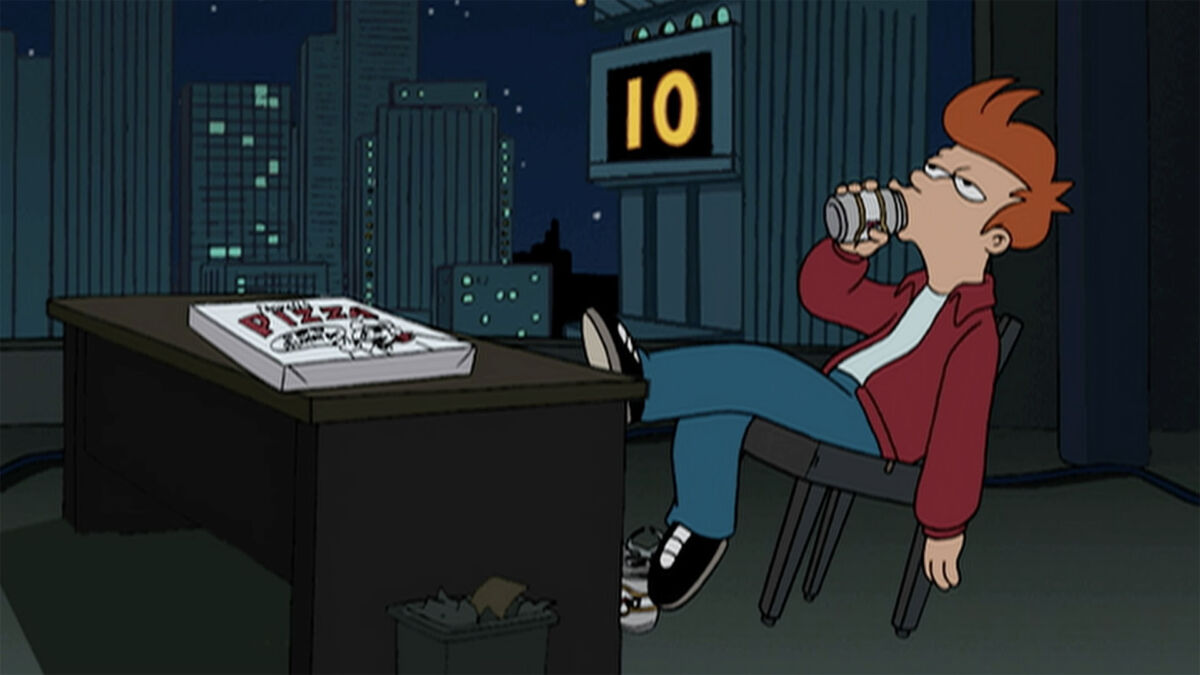
“Welcome to the world of tomorrow!”
The episode that started it and spawned a hit that would go on to dominate the airwaves, aside from about three cancellations and a change in network, that is.
Anyone reading a list of the best Futurama episodes is probably well aware of the episode’s premise, but to recap: Philip J. Fry, pizza delivery boy and slacker is sent on a delivery to Applied Cryogenics but instead ends up falling into a cryogenic tube and is frozen in stasis for the next 1000 years. Year 3000, out he pops, Leela, Bender, a hideous crab monster, tubes everywhere; you know the drill.
Pilots are immensely tricky affairs, especially for comedies, as they’re charged with establishing the tone, dynamics and feel of a show straight off the bat. In this sense, the episode does an admirable job of plunging its protagonist, and the viewer, into the world of tomorrow about as smoothly and painlessly as one could hope.
The real reason The Series Has Landed deserves a place on this list is that it remains pertinent to the series’ overarching lore, constantly being revisited, reimagined or reframed through a different lens to offer greater detail or explanation as to Fry’s place in the future. Of everything that happens in Futurama, Fry’s cryogenic preservation feels like the most significant, with episodes such as Anthology of Interest I, The Why of Fry, and Jurassic Bark all referencing Fry’s inevitable freezing at Applied Cryogenics.
If Futurama has a central story, it is that of Philip J. Fry.
READ MORE OF THE BEST FUTURAMA EPISODES
Some of the coverage you find on Cultured Vultures contains affiliate links, which provide us with small commissions based on purchases made from visiting our site.
